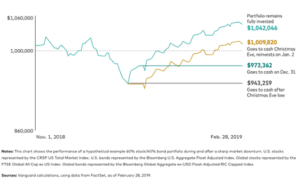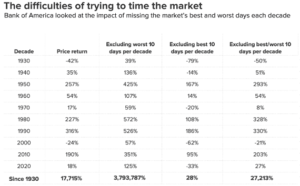We’re often told that investing is risky – but it’s not until times like this that it hits home!
Most of us have been through market volatility and have come out the other side, but when the markets are down in excess of 20% it’s no surprise that we start to question our beliefs.
Below, I answer two questions we commonly get asked during market volatility;
– Can I switch all of my investments into cash, and then reinvest when the market returns to ‘normal’?
Firstly, the current market volatility is a sign of a functioning market. Whilst it is uncomfortable downturns aren’t rare events and they all occur in all markets in a typical investors lifetime.
Secondly, you cannot deny market losses can sting, but it’s important to keep a long term perspective and stay invested in order to participate in the recoveries that typically follow. Whilst the decline has been relatively consistent, recoveries generally are more dramatic and often last longer, resulting in investors being well compensated over the longer term.
Thirdly, it is impossible to time ‘the bottom’ of the market. Generally, the market is a lead indicator of the broader global economy, where as the economy is largely a reflection of what we are seeing on the ground today. Even if we continue to see discouraging data (recession, inflation, covid, war etc) history has shown us that stock markets typically hit their bottom before the worst news arrives and the peak economic pain is upon us.
Fourthly, investment ‘losses’ are paper losses only, they aren’t ‘realised’ or crystalised until you make a change or sell the investment. The short-term price movement of your portfolio is irrelevant if you have no need to sell that investment. Another way to think about it is price is what you pay, value is what you get. Whilst the economic outlook is uncertain there a lot of great companies with fantastic futures that are cheaper now than they have been in the past. This is why we use the bucket strategy for retiree portfolio’s as well as the core and satellite approach for accumulators, to ensure we have prepared for downturns and don’t have to sell the right asset at the wrong time plus have the flexibility to take advantage of opportunities should they arise.

Figure 1: if you were to move your funds to cash on the Christmas Eve low in 2019 and stayed in cash your investment would be worth $943,259, whereas if you had stayed fully invested your portfolio would be $1,042,046 ($98,787 behind if went to cash).

Figure 2: Clients often suggest that they wouldn’t stay in cash and that they would enter ‘near the bottom’. The difficulty is that generally nobody can define what that means nor confidently start re-investing, leading to delay and missing the ‘best days’. If you look at the 2020 decade, the price return was 18%, if you missed the 10 best days then you would’ve been -33%.
In addition, selling investments & buying back into investments may result in triggering of capital gains tax (even within super) and trade costs.
– Is my asset allocation still right for me? Am I still on track for retirement / my financial goals?
Generally, we have designed your financial plan and corresponding portfolio taking into consideration your goals, account balance, investment preferences and risk profile. The returns we use are ‘average’ which take into account swings just like what we are experiencing now.
For some the temptation is to move funds in bonds and cash into growth assets, for others the temptation is to move all assets into cash. It’s important to speak to your adviser as the ‘right thing to do’ isn’t a one size fits all answer.
What can we do?
- Zoom out, focus on the long term results!
- Reach out to your adviser & get tailored feedback based on your specific situation.
- Tune out & limit the amount of financial news you engage with
- Stay diversified
- Stay invested
- Stick to regular investment plans
- Ensure you have a sufficient cash buffer
- Reduce trading costs and potential CGT implications (even within super)
